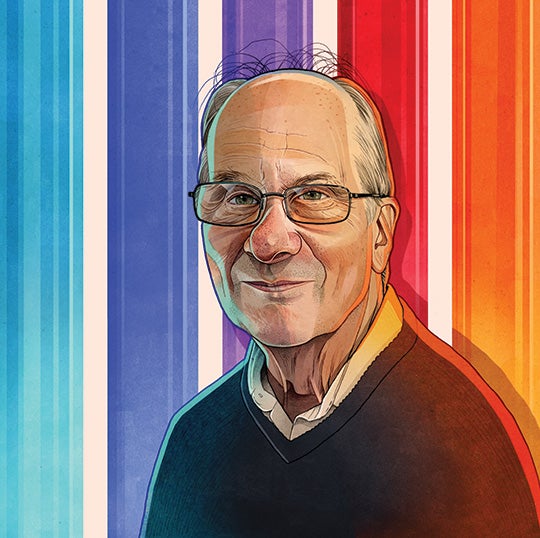No Small Award
Alumnus Louis Brus wins the Nobel Prize for the discovery of “quantum dots.”

Spring 2024
By Silvia Cernea Clark
On Oct. 4, Louis Brus ’65 was awarded the Nobel Prize in chemistry for the discovery and development of “quantum dots,” nanosized particles with unique properties “that now spread their light from television screens and LED lamps,” according to a Royal Swedish Academy of Sciences announcement.
Brus, who started his undergraduate education at Rice in 1961, shares the distinction with Moungi Bawendi, a professor at MIT, and Alexei Ekimov, the former chief scientist of Nanocrystals Technology Inc. Their work has been crucial to the development of nanotechnology, which has helped drive major computing advances and transform electronics. The Swedish Academy highlighted Brus’ role as “the first scientist in the world to prove size-dependent quantum effects in particles floating freely in a fluid.”
While at Rice, Brus studied chemistry, physics and mathematics and developed “a love of history that has stayed with me to this day,” he said in a statement delivered when he received the 2008 Kavli Prize in nanoscience. Brus praised his undergraduate alma mater for its “rigorous, fundamental, yet broad education,” adding, “Rice was a wonderful place.”
After earning his bachelor’s degree at Rice, Brus earned a doctorate in chemical physics from Columbia University in 1969 and then served as a scientific staff officer at the U.S. Naval Research Laboratory in Washington, D.C. Upon concluding his service as a Navy lieutenant, Brus joined AT&T Bell Labs in Murray Hill, New Jersey.
Naomi Halas, founding director of the Laboratory for Nanophotonics and former director of the Smalley-Curl Institute, met Brus during his career at Bell Labs. “Lou has had the visionary ability to come up with entirely new ideas and the determination to realize them in the laboratory,” she says. “Along with his co-laureates, he created a link between nanomaterials and optics that never before existed. The transition from laboratory research to the real world — QLED TVs, for example — provides the strongest rationale for fundamental research.”
Brus, currently the Samuel Latham Mitchill Professor Emeritus and special research scientist at Columbia, has maintained ties to Rice through his relationships with faculty and his service on chemistry department visiting committees.
“Lou’s pioneering work on quantum dots changed the way we see the world, and optoelectronics would not be where they are today without his contributions,” says Ramamoorthy Ramesh, Rice’s vice president for research.
